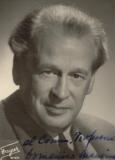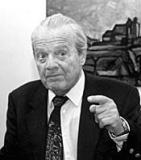
Info about Paul van Kempen 
The Dutch lyric-dramatic soprano Gré Brouwenstijn (August 26, 1915–December 14, 1999) was a famous opera singer whose stage career spanned from the early 1940s to the mid-1970s. She was admired for her warm, radiant voice, her stage presence, her dramatic instincts, and her "Ingrid Bergman" looks. Brouwenstijn was above all associated with the role of Leonore in Beethoven's Fidelio. Considered one of the finest Leonores of the post-World War II period, she performed the role to great acclaim at the Vienna State Opera, the Paris Opera, Stuttgart, Berlin, Amsterdam, Buenos Aires, London, and Glyndebourne. Brouwenstijn was born Gerda Demphina in Den Helder. She studied voice at the Amsterdam Muzieklyceum, with Jaap Stroomenbergh, Boris Pelsky and Ruth Horna. She made her operatic début in 1940 as the First Lady in The Magic Flute. Brouwenstijn then became a member of the Hilversum Radio Choir, later performing as a soloist in operatic broadcasts. In 1946, she joined the Netherlands Opera, where she made her debut as Julietta in 'Les contes d'Hoffmann'. In 1949, Brouwenstijn made her debut at the Holland Festival as Leonore in Il Trovatore, the beginning of a long association with that event. In subsequent years, she sang Reiza, Jenůfa, Amelia, Donna Anna, Desdemona, the Countess, Tatyana, Leonore (Forza), Senta, Iphigénie (en Tauride), and Leonore (Fidelio) at the Festival. In 1951, Brouwenstijn made her debut at the Royal Opera House, Covent Garden as Aida (in English), conducted by Sir John Barbirolli. Her Berlin debut in 1954 caused "something of a sensation"; the critic praised her "phrasing in Italian opera"[1]. In 1955, under Rafael Kubelík, she sang Desdemona. In 1958, she sang Elisabetta in a famous production of Don Carlos designed by Luchino Visconti and conducted by Carlo Maria Giulini. In 1958 she sang Leonore at the Teatro Colón in a production of Fidelio conducted by Thomas Beecham. From 1954 to 1956, she appeared at Bayreuth, as Elisabeth, Freya, Sieglinde, Gutrune and Eva. Two Wagnerian roles she performed elsewhere, Senta and Elsa, she never performed there, however, due to a breach in 1957 with the Wagner family. In 1959, she made her American debut as Jenůfa at the Lyric Opera of Chicago. She made her farewell appearance, singing Leonore, with the Netherlands Opera in 1971. Brouwenstijn died in 1999 at age 84 in Amsterdam.

Maria von Ilosvay (8 May 1917–16 June 1987) was a Hungarian contralto renowned for her performances of the role of Erda in Richard Wagner's Der Ring des Nibelungen. She studied in Budapest and Vienna, and in 1937 won first prize in the International Singing Contest in Vienna. In 1940 she joined the Hamburg company. She appeared as guest artist in Vienna, Brussels, Amsterdam and Salzburg. She became a mainstay at the Bayreuth Festival following its re-opening in 1951 when she made her debut there. She recorded the role of Erda in live recordings from Bayreuth conducted by Clemens Krauss and Joseph Keilberth. 
Oskar Czerwenka (5. Juli 1924 in Vöcklabruck; 1. Juni 2000 ebenda) war ein österreichischer Sänger (Bass). Er war auch als Maler, Illustrator und Autor tätig. Oskar Czerwenka wuchs in seiner Geburtsstadt Vöcklabruck in Oberösterreich auf. Er studierte Welthandel und begann dann in Wien eine private Gesangsausbildung. Sein Debüt als Sänger gab er 1947 in Graz. 1951 wurde Czerwenka Ensemblemitglied der Wiener Staatsoper, was er bis 1986 blieb. Er sang auch an der Volksoper Wien sowie an allen großen Opernhäusern der Welt, darunter 1958 erstmals an der Metropolitan Opera. Hinzu kamen Gastspiele bei den Salzburger Festspielen (ab 1953), und den Bregenzer Festspielen. Zu Oskar Czerwenkas Repertoire gehörten 75 Partien. Eine seiner bekanntesten Rollen war die des Ochs auf Lerchenau in Der Rosenkavalier. Weitere wichtige Partien waren Graf Waldner in Arabella, La Roche in Capriccio, Kezal in Die verkaufte Braut und Osmin in Die Entführung aus dem Serail. Eine seiner letzten großen Rollen in den 1990er Jahren war die des Milchmanns Tevje in Anatevka. Czerwenka sang auch bei den Uraufführungen der Opern Der Prozess von Gottfried von Einem (1953 bei den Salzburger Festspielen), Irische Legende von Werner Egk (1955) und Jacobowsky und der Oberst von Giselher Klebe (1965). Ferner wirkte er als Konzert-, Lieder- und Oratoriensänger. 
Petre Munteanu
Born: November 26, 1916 - Campina, Romania
The Romanian tenor, Petre Munteanu, studied singing and violin playing at the Conservatory of Bucharest. In 1940 Petre Munteanu made his operatic debut at the Royal Opera of Bucharest. However he continued his studies in Germany and went to Berlin, where he became a student of H. Weissenborn. After the World War II, he excited the Italian public as a concert singer. In 1947 he made his debut at the opera of Rome as Don Ottavio in Don Giovanni. In the same year 1947 he came to the Milan’s La Scala, where he appeared in the role of Ferrando in Così fan tutte. He then continued on to participate in the premiers of Igor Stravinsky’s Persephone, Cimarosa’s Credulo and Alban Berg’s Wozzeck. In 1954 he sang at the Opera of Rome in the first Italian performance of the fairy tale opera Snegourotchka by Rimsky Korssakow. Further appearances at the Covent Garden Opera in London, at the State Operas of Vienna and Munich, at the opera houses of Triest, Florenz and Napoli. In 1948 he sang at the Festival of Edinburgh, and in 1948-1949 at Glyndebourne Festival as Ferrando in Così fan tutte. In 1961 he participated in the Teatro Fenice Venice in the premiere of the opera Intolleranza 60 by Luigi Nono. He could also be heard in Madrid, in the Scandinavian countries and in Australia (1958). Petre Munteanu's great opera stage roles included Tamino into Die Zauberflöte, Pedrillo in Entführung aus dem Serail, Fenton in Verdi’s Falstaff, Cassio in Othello, Count Almaviva in The Barbiere of Sevilla, Pylades in Gluck’s Iphigénie en Tauride, and Filipeto in Wolf-Ferrari’s I quattro rusteghi. In 1968 he appeared inn Turin for the first time as a conductor into appearance. Later he worked later than pedagogue at the Conservatory of Giuseppe Verdi in Milan. Apart from the perfect control of the Italian Belcanto in operas of Bellini, Rossini and Donizetti, Munteanu excelled also as a Mozart interpreter, and in the concert halls in oratorios of J.S. Bach and Georg Frideric Handel and in Lieder recitals.
Giuseppe Verdi Requiem Mass Petre Munteanu, tenor Oskar Czerwenka, bass Maria von Ilosvay, contralto Gré Brouwenstijn, soprano Santa Cecilia Academy Rome Chorus Santa Cecilia Academy Rome Orchestra Paul van Kempen
1955
|

